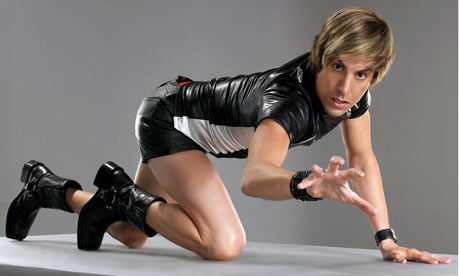
It may have been the visit to the swingers' party that did it. Or perhaps it was the scene where Brüno drops in to see a medium and simulates oral and anal sex with a ghost.
Either way, the antics of Sacha Baron Cohen's latest comic antihero – the prancing gay Austrian journalist Brüno – all appear to be too much for Ukraine. According to reports, Ukraine's culture and tourism ministry is set to ban the film Brüno, which was due for release in the post-Soviet country next week.
The ministry has so far not explained its decision. But it appears to have taken the view that several of the scenes – among them a mock gay parade, and one in which Brüno shows off his penis – were likely to offend conservative and religious opinion. Ukraine's Catholic west and orthodox east take a dim view of gay rights, and hold highly traditional social views. And despite efforts by Ukraine's western-leaning political elite to integrate with Europe, there is little sign of a more liberal view taking hold.
"Ukrainian society is a conservative one. The topic is not discussed, but in reality public attitudes are exactly the same as in Russia," one Ukrainian diplomat said last night. "The west of Ukraine, especially, is very conservative on family issues. They are devoted Catholics, and Greek Catholics."
In Russia, and much of eastern Europe, homophobia remains widespread. Last month, Moscow's mayor Yuri Luzhkov, who has denounced gay parades as "satanic", sent in riot police to break up a small demonstration of gay rights activists protesting during the Eurovision song contest.
Baron Cohen's last film – Borat, or Cultural Learnings of America to Make Benefit Glorious Nation of Kazakhstan – was also banned in Ukraine. Other post-Soviet countries, including Russia, similarly outlawed the film, unwilling to offend Kazakhstan's touchy leader, Nursultan Nazarbayev. Needless to say, Kazakhstan banned Borat, too.
Another factor is Ukraine's presidential election: the country's president, Viktor Yushchenko, is staging an uphill struggle for re-election in January. In 2004, he received the support of Ukraine's powerful Catholic church. His officials may calculate that the anti-Brüno factor could just revive his flagging appeal among elderly voters.
Yesterday, however, some sources in Ukraine's cinema industry suggested that the controversy may simply be an elaborate publicity stunt, dreamed up by distributors Sinergia to boost the film ahead of its release.
The Ukrainian website korrespondent.net, however, today reported the ban was genuine.
Since its release last Friday, the 18-certificate Brüno has gone to the top of the US box office, and earned £35m in the UK. Amid reports of queues of teenagers being turned away from cinemas, its makers are now preparing a second, more teen-friendly version, to be released in Britain on 24 July.
Universal Pictures has trimmed the original film by 1 minute and 50 seconds. And it has excised some of the more lurid scenes, including the one with the ghost.

